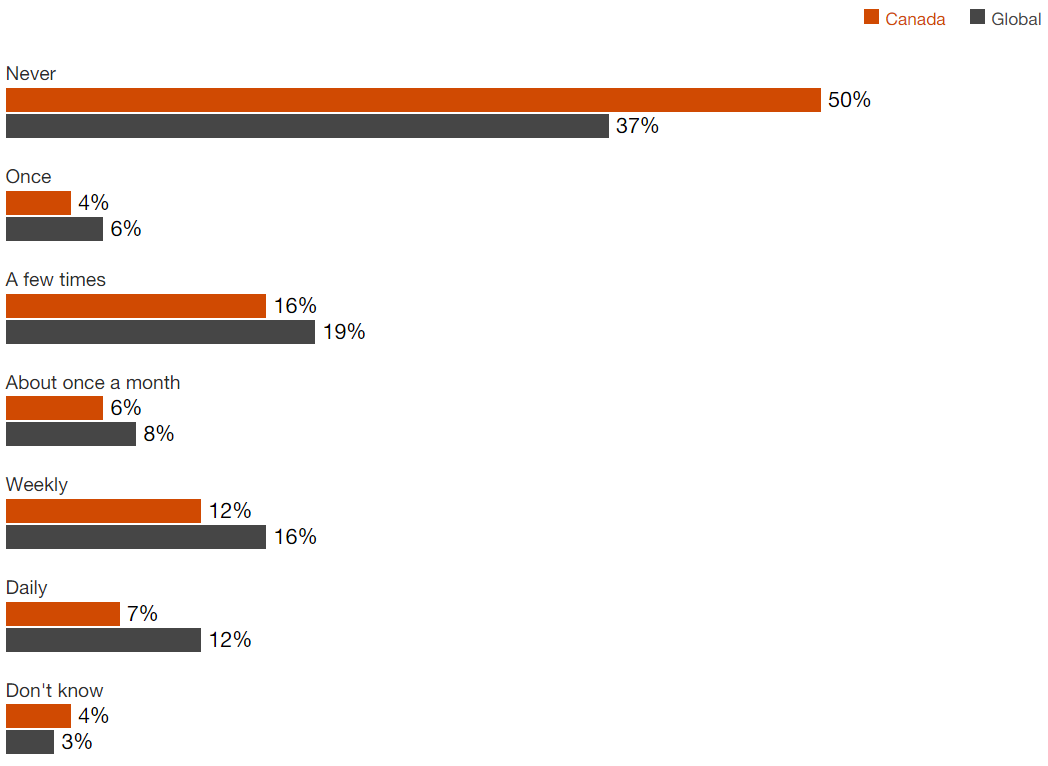Amid technological change, many workers 'don't understand why things need to change,' finds report

As the surge of generative artificial intelligence (GenAI) continues, many employees do not see the importance of adopting the new technology, according to a recent report.
Just 38 per cent of workers believe that technological change will impact their job over the next three years, reports PwC.
This is the case even though 50 per cent of employers see technological change as the top factor that will drive changes in the way they create, deliver and capture value in the next three years.
“This disparity is concerning given the large portion of Canadian and global respondents to our CEO Survey who told us their businesses may not exist in a decade if they continue on their current path,” says PwC.
“They need their employees to be onside with the actions required to change that trajectory, and that starts with workers recognizing the challenges and their role in helping overcome them. A significant number (41%) of Canadian workers told us they don’t understand why things need to change.”
Overall, 90 per cent of employers say that adapting to technological change is a moderate to high priority. However, nearly half (48 per cent) feel their employees are barely or not at all prepared to use AI or GenAI, according to a previous report from Deloitte.
What percentage of employees use AI?
Currently, few employees are consistently using AI for their work. And Canadian workers are falling behind their global counterparts, reports PwC.
Just one in 10 Canadians are using AI daily or weekly, and 50 per cent have never even used it. Globally, 37 pe cent of workers have never tried out AI for work.
Source: PwC
According to PwC’s AI Jobs Barometer report – which analyzed more than 500 million job postings in Canada and around the world – the share of ads demanding AI-related skills almost doubled between 2012 and 2023.
“Importantly, those jobs with higher AI exposure – meaning AI can perform some tasks – saw more change in the skills required. Findings like these only reinforce the need for Canadian workers, especially those in the most AI-exposed roles, to develop new skills to remain relevant in the job market,” says PwC.
Few change management professionals and decision-makers for GenAI strategy or data analytics are now using AI, according to previous reports.
Also, despite the benefits that AI can bring, C-level executives are taking a cautious approach to AI adoption. Just under one-fifth (19.6 per cent) of Canadian C-level executives have already adopted AI in their business operations, according to a previous The Conference Board of Canada report.
“The preferred plan is incremental adoption, with 12.5 per cent of Canadian C-level executives planning to adopt AI ‘immediately’ across some business units or operations and 51.2 per cent planning to ‘explore options for adoption in the future’,” says the board.
How do you prepare a workforce for AI?
Here’s how employers can encourage employees to use AI at work, according to a report from the U.S. Chamber of Commerce:
- Provide a framework for how it should be used.
- Choose the right tools and implement them gradually.
- Support experimentation.
“By championing AI adoption and embodying its use in our operations, we inspire employees to embrace AI technologies, driving innovation and growth across the organization,” says Yushiro Kato, CEO and Co-Founder of the SaaS manufacturing company that produces CADDi Drawer, in the report.




